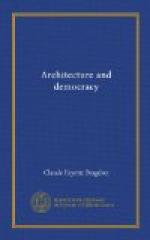You have not thought deeply enough to know that the heart in you is the woman in man. You have derided your femininity, where you have suspected it; whereas, you should have known its power, cherished and utilized it, for it is the hidden well-spring of Intuition and Imagination. What can the brain accomplish without these two? They are the man’s two inner eyes; without them he is stone blind. For the mind sets forth their powers both together. One carries the light, the other searches; and between them they find treasures. These they bring to the brain, which first elaborates them, then says to the will, “Do”—and Action follows. Poetically considered, as far as the huge, disordered resultant mass of your Architecture is concerned, Intuition and Imagination have not gone forth to illuminate and search the hearts of the people. Thus are its works stone blind.
It is the absence of poetry and beauty which makes our architecture so depressing to the spirits. “Poetry as a living thing,” says Mr. Sullivan, “stands for the most telling quality that a man can impart to his thoughts. Judged by this test your buildings are dreary, empty places.” Artists in words, like Lafcadio Hearn and Henry James, are able to make articulate the sadness which our cities inspire, but it is a blight which lies heavy on us all. Theodore Dreiser says, in Sister Carrie—a book with so much bitter truth in it that it was suppressed by the original publishers:
Once the bright days of summer pass by, a city takes on the sombre garb of grey, wrapped in which it goes about its labors during the long winter. Its endless buildings look grey, its sky and its streets assume a sombre hue; the scattered, leafless trees and wind-blown dust and paper but add to the general solemnity of color. There seems to be something in the chill breezes which scurry through the long, narrow thoroughfares productive of rueful thoughts. Not poets alone, nor artists, nor that superior order of mind which arrogates to itself all refinement, feel this, but dogs and all men.
The excuse that we are too young a people to have developed an architecture instinct with that natural poetry which so charms us in the art of other countries and other times, Mr. Sullivan disposes of in characteristic fashion. To the plea that “We are too young to consider these accomplishments. We have been so busy with our material development that we have not found time to consider them,” he makes answer as follows:




